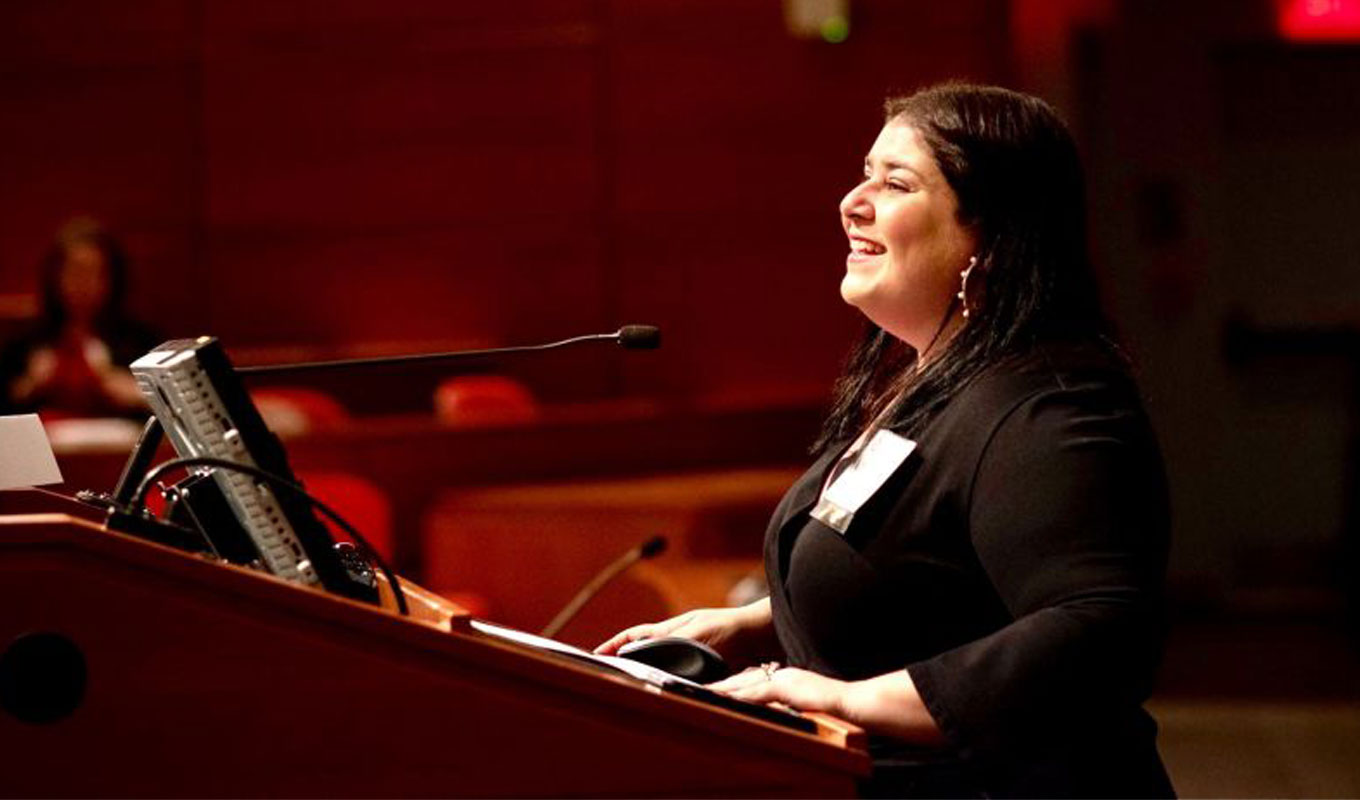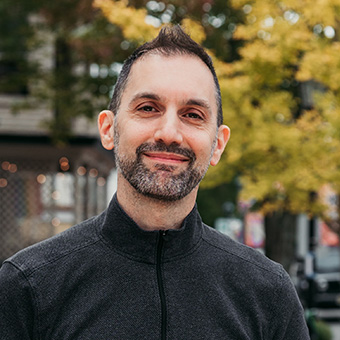
Jennifer Lynn Robinson
Podcast: Play in new window | Download
Jennifer’s journey is quintessentially American. It’s a story of a daughter of hard-working, immigrant parents who came to this country and strove to make good in the land of opportunity – a daughter who followed in her father’s footsteps, fostering a family legacy and living the American Dream. Until, that is, a terrible accident changed the course of her life, and forced her to reckon with her new normal. Just like her parents and grandparents before her, she faced her challenges head on, and like the phoenix that rises from the ashes, she reinvented herself to make purpose out of tragedy.
LINKS:
- Purposeful Networking
- Villanova Law
- Saved Me Animal Rescue
- Hospital of the University of Pennsylvania
- Bryn Mawr Rehab Hospital
Full Transcript
Chris Straigis – 0:02
From AAC Studios, welcome to Scrappy, the podcast about small companies doing big things. I’m your host, Chris Straigis. Today, we’re heading back to the east coast, to my native Philadelphia, for a story that really is quintessentially American. The story of a daughter of hard working immigrant parents, who came to this country and put all of their effort into providing a life full of opportunity that they wouldn’t have found back home. And then that daughter taking the reins of that effort and making good – until fate changed her course.
Chris Straigis – 0:41
Jennifer was following in her father’s footsteps, building success in the field of law and giving back through community activism. But then, in an instant, a tragedy that irrevocably changed the course of her life, or more accurately forced her into a new life. While a situation like hers can knock even the toughest players out of the game, Jennifer drew on the strength inherited from her parents and grandparents and instead became the Phoenix that rose from the ashes. This is Jennifer Lynn Robinson.
Jennifer Lynn Robinson – 1:15
My business is purposeful networking. I’m the founder and CEO.
Chris Straigis – 1:20
Jennifer is a business networking expert, motivational speaker and moderator who’s been on CBS, NBC and Fox. And she’s been featured in Forbes, the Huffington Post, the Chicago Tribune and more. Her story of strength and endurance really begins with her parents and grandparents.
Jennifer Lynn Robinson – 1:41
I am first generation American so both my parents were immigrants and that definitely had a big impact on my childhood. My grandmother was amazing. So she, most of her family died in the Holocaust and her and one sister hid in a hole on a farm during the war. In exchange for seamstress work, and they survived the war, she met my grandfather. They had my father and fled Poland – an after-war kind of situation – and came into Ellis Island with nothing, with my father as a toddler.
Jennifer Lynn Robinson – 2:16
So my mom family is from Fez, Morocco and my dad from Krakow, Poland. Her family left in the late 60s Morocco because of anti semitism from the ruler there – said they were going to a wedding in Paris, took a suitcase with them left their house never came back. And my mother met my father in Israel. My father was there visiting with a law school classmate of his, and they met there. So I think for me, my parents, you know, knew what it was to have nothing. You know, grew up in kind of turbulent circumstances and education was really kind of the main thing you know, that was what was stressed in our house more than anything else.
Chris Straigis – 2:57
So for Jennifer, she grew up in a space where the emphasis was on hard work and education, these were the key to the American dream. Her parents put that into practice every day. Her dad working his way through law school, and her mom earning an advanced degree.
Jennifer Lynn Robinson – 3:14
My father, so he was a big trial lawyer, you know, very well known, and I would go watch him do trials, I would he taught at Temple law for a long time. So I would go watch him teach. And, you know, so from a very young age, I not only knew I wanted to be a lawyer, but I wanted to be a litigator or a courtroom lawyer, because that’s what he did. And that’s what interests me. I love to talk love to argue. So yeah, that was a path from a very young age. I wanted to go down.
Jennifer Lynn Robinson – 3:45
So he worked very hard to get there. And as a result, you know, to be honest, we didn’t see him much. He was always working. So yeah, he stressed education, but he really wasn’t around much. You know, we weren’t the kind of family that sat and had dinner together. My mom was the driving force. She had a PhD that she got when she was pregnant with my youngest sister, was working on it for years, and also spoke seven languages. She was, she’s passed away, but she was really impressive lady. And my parents split up when I was, I believe around 13 or 14. They had a very public long, bitter divorce that was on the press, and that made things very, very difficult for our family.
Chris Straigis – 4:27
Unfortunately, this was all too much a part of the American landscape too – a bitter divorce with her and her two sisters caught in the crosshairs, left to try and build their lives through the trauma. But Jennifer kept going, parlaying her ingrained focus on education into an acceptance to college. Though it was a bit of a rocky start.
Jennifer Lynn Robinson – 4:49
I got accepted to Temple and Villanova. I come from a Temple family, pretty much everybody went to Temple. And the idea of going to an urban school in the middle of the city just didn’t sit well with me. And it’s funny because I’m not that person at all now, but at the time, the idea of going down the road to the same, you know, suburban area I was in to go to Villanova had a lot more appeal to me. And, you know, I think what was wrong with it was, you know, I would say two things at the time. And again, this was many years ago, so things have changed at both schools. Villanova didn’t have any kind of trial program. And that’s what I wanted to do. I took a few classes there that were the first time they had offered, you know, trial advocacy, advanced trial advocacy. I was very much a minority there. I want to say there were somewhere around nine to 10 Jewish students. And I remember at one point going to a professor my first year telling them that I would have to miss class for High Holidays for Yom Kippur, and them pointing to the cross above them and saying, I chose to go to a Catholic school and they wouldn’t help me make up the work.
Chris Straigis – 5:49
She was also dealing with some unexpected medical issues in that first year of college. She told me how these almost derailed her momentum, but instead solidified her self confidence as a fighter. She had emergency surgery for her gallbladder and ended up missing most of her entire second semester.
Jennifer Lynn Robinson – 6:10
When I did come back, I got called them to the Academic Dean, and was asked to drop out and restart the year. And so at that point, you know, I took on, like most people, tons and tons of loans, and I said, ‘well, are you going to reimburse me the tuition for the year?’ And they said, no. And I said, ‘well, I’m not going to drop out.’ You know, I think that was kind of the start of me, being in a situation where somebody was telling me I couldn’t do something. And I was like, ‘try me’, you know?
Chris Straigis – 6:36
Jennifer realized that she wasn’t going to graduate with Honors, but that wasn’t going to stop her. While still in school, she landed a job as a law clerk with Cigna in their major litigation department. She knew this was a pretty big break considering many of her school colleagues were working in much more mundane positions.
Jennifer Lynn Robinson – 6:56
So I came out of college went directly to law school, and then while I was in law school, I got a job. I was Cigna down here in their major litigation department. I would go into Cigna, actually, three days a week and do all my classes two days a week, because, you know, I wanted the experience and I needed money. I felt very fortunate to get that job as a law clerk, because I would say the majority of my friends that had jobs during law school, they were making copies and, you know, making you know, looking at the case and analyzing it, maybe. I was fortunate in the people I worked for at Cigna, they gave me real work. Upon graduation, they hired me into their major litigation department, which was super interesting work, because at the time, that was tobacco litigation, environmental spills, product liability. It was very high-level and it was challenging. And so I feel like that was, you know, something great to start with as a young person.
Jennifer Lynn Robinson – 7:47
I started volunteering, actually with the Bar Association, and then through the Bar Association got involved with Community Legal Services. And it was, I mean, it could not have been farther from what I just described at Cigna. So basically, you know, as a volunteer attorney for them, my role was to have people come in and tell me their circumstances, which were all tragic and sad. And then based on the situation, even though they were all sad, I had to determine if they had the legal grounds to go in front of a judge and get immediate relief from what they were requesting. And, you know, that’s really hard, you know, when people are in bad circumstances, but you know, I would regularly hear about abuse and neglect and you know, a lot of situations where people were either at home kids at home with either no parent, or one parent or a boyfriend and the picture that was abusing them or something of that nature, lack of food resources, showers, you know, money, all kinds of terrible circumstances.
Chris Straigis – 8:48
So Jennifer had gotten some great experience with Cigna and conversely had seen a whole different side of the law with her community services volunteer work. It was a well rounded trajectory. She was firing on all cylinders. A friend recommended her to one of the biggest insurance companies in the country. And she dove headlong into the insurance world. Eventually coming to rest at a job she loved with AAA Mid Atlantic. She was happy; great co-workers, a great boss, and nowhere to go but up. That is, until a fateful day in 2008.
Jennifer Lynn Robinson – 9:30
I was working I was full time in-house at AAA Mid Atlantic, it was a great company to work for. The company obviously is big, but I worked in the Philly legal office, which was like nine or 10 of us at the time. So it was very close group, like a second family, and I loved my boss, loved the work. You know, my sister, my youngest sister, was getting married the week after my accident, and at the time she was living in University City. And most of my doctors were here downtown. So I had a routine doctor’s appointment, and I took a half day from work, went to HUP, you know, Hospital of the University of Pennsylvania, had my doctor’s appointment and then my plan, I took off the rest of the afternoon. My plan was to go over to her apartment and help with some last minute wedding stuff.
Jennifer Lynn Robinson – 10:18
If you cross any city street, not just in Philly, but pretty much everywhere, you know, you look at the other side of the street and there’s usually like a countdown. But I looked at it and I thought, I may not have as many seconds as I need to cross the street safely. So I actually watched it turn, waited for a red light, waited a whole other cycle until it turned green again and I had the right away, and I started crossing the street.
Chris Straigis – 10:40
The truck wasn’t speeding or out of control in any way. It was simply a matter of timing, of fate. Jennifer was hit and literally pinned under the truck to the point where they needed to bring in another vehicle just to lift the truck off of her in order to get her into a waiting ambulance. It was bad; really bad.
Jennifer Lynn Robinson – 11:08
I wasconscious for the whole thing and didn’t lose consciousness until the ambulance and that’s probably one of the reasons I suffered so long with PTSD, and probably still suffer with it to some extent. Once they put me in the ambulance, I was unconscious. I don’t know for how long. There were initial injuries and then there were a lot of injuries that I had over time, but like, you know, people aren’t really concerned with what they’re trying to save your life. I had a severe head injury which resulted in what they considered mild traumatic brain injury. I had a hemorrhage of my eye, I had facial fractures. I had a broken ribs I had a collapsed lung. It’s hard to talk…
Jennifer Lynn Robinson – 11:46
My right arm was shattered. So, you know, that’s my dominant arm, so they were really concerned with that at the hospital because they were telling me for a few days they didn’t know if I’d have use of my arm. They didn’t know what the use would be what feeling I would have and ultimately, they had to have like a whole team of doctors do a very extensive surgery to put my arm back together. You know, I had cognitive problems, I balance problems. I ended up having, you know, shoulder surgery, hand surgeries.
Chris Straigis – 12:20
Eventually she was transferred out of the hospital for a long recovery.
Jennifer Lynn Robinson – 12:24
They didn’t feel like I was well enough to deal with going to a regular rehab at that point. I had a lot of issues going on. I couldn’t really hold conversations like I normally would. I had memory problems. I had problems with light and noise and distractions. I had nightmares. So they had Penn Care at home, come to my house to work with me for about two months. And then when they decided I could go in somewhat the regular population, I guess, I went to Bryn Mawr rehab for I want to say close to seven months. I didn’t work for six months. And then that was also some drama because I wanted to go back.
Jennifer Lynn Robinson – 13:04
I know I couldn’t go back to court – I wasn’t allowed to go back to court because of all the issues I talked about. I couldn’t remember my cases, I couldn’t think on my feet, I couldn’t hold conversations, all of that. I missed the people I worked with, I missed having some schedule and normalcy. You know, my whole life was rehab and medicines and doctors. And I mean, I, I literally would say at one point, I probably had 15 or 20 doctors I was seeing. So, you know, given all of that I said, I was going to go try to go back part time to my job at AAA Mid Atlantic, which was going to be, at that point, more of a desk job. And all my doctors, my therapist, my psychiatrist, like everybody I was working with at that time said I shouldn’t do it. And I was like, screw that. I thought it would help me because I was so depressed and I thought having some normalcy to my schedule was going to be a positive benefit. You know, I went back and in hindsight, now, years later, it was a mistake.
Chris Straigis – 14:06
She was making slow but steady progress with her therapy. But she was struggling to get herself back to where she needed to be, cognitively, to do the work she was trying to do. She just couldn’t seem to reclaim the level of concentration and focus that her job required.
Jennifer Lynn Robinson – 14:23
Even a few years out, I was not really doing better. Basically, from what I was being told, you know, I was never going to be able to go back to the kind of life I knew.
Chris Straigis – 14:37
Talking with Jennifer, she’s built such a successful career since her accident. But in the midst of it, the years of therapy and surgeries and a struggle to recalibrate her life, she was being told that this was her new normal. Looking back now, it’s obvious that she, like most strong, high-achieving people, ended up defining what that normal would be. But that didn’t happen overnight. In 2011, still dealing with the long term after effects of the accident, she was thrust into another trauma. Her mom and her mother in law, both died in the same week. It was another setback in her long recovery. Her therapist called it a compound trauma. Jennifer broke down.
Jennifer Lynn Robinson – 15:26
I mean, it was just like, ‘am I going to find a way to bring myself out of this or am I not going to?’ And that was pretty much what it came down to, you know. And you know, it really, it wasn’t like I just got up one day and said, this is it. But I mean, ultimately, those those are the choices. There’s so many things in life where you can just wallow in it and it can define your life and I had to look at my situation and then everything that my mom had gone through. And you know, that was really hard. And what I can learn from that, which was kind of like she let certain things define her life that didn’t have to define her life. And that was what she chose. And I didn’t have to choose the same thing.
Chris Straigis – 16:04
And so she made her choice. Jennifer decided to start a business. She knew that she wasn’t able to continue down the legal path. But she wanted to do something that allowed her strengths to shine. She figured that she could tie together her experience in business, nonprofit, and community work.
Jennifer Lynn Robinson – 16:22
I decided to open a business doing consulting, trying to bring businesses and nonprofits together, because I thought there was a lot of value in that. I’d seen how having these corporate relationships really helped the nonprofits and vice versa. And I thought that, you know, a lot of times nonprofits can’t afford to hire staff and I could serve as a consultant to help bring these people together. I started really hustling and like you have to when you start a business and people started coming to me for help with marketing and networking. And then, you know, a couple people I was close to said, ‘why aren’t you doing this? This is really what you’re good at.’ I would say in less than a year, I ended up rebranding it into focusing on networking. And that was because a couple key people in my life made me realize that that is what I was doing anyway.
Jennifer Lynn Robinson – 17:11
I think it was, in the first couple months of starting the business, I went to a networking event, and sat at a random table at the Union League with some people at the event and just started, you know, saying, ‘oh, I started this business and I never thought I’d be an entrepreneur and I really, I have no idea how to run a business. Frankly, I have no business doing this.’ And I started talking to this nice gentleman who ended up being the husband of the woman running FemCity at the time. So I guess he, you know, sensed that I needed some kind of support and said, ‘you know, you should join my wife’s organization.’ So I joined FemCity and for me, it’s been invaluable because all my connections at the time were really in the legal community, and I didn’t have that community anymore.
Jennifer Lynn Robinson – 17:54
And there were, you know, a lot of people in my legal community, including some family, that didn’t really understand what I was doing, didn’t understand why I wasn’t going back to law, didn’t really support you know, what I was trying to do at the time. So FemCity for me became that support, you know, of having that community around me – to encourage me, you know, to go to the event, to go to for resources and, you know, mistakes and all that stuff. It ended up being that community for me.
Jennifer Lynn Robinson – 18:24
So the the woman who ran it, who is a very good friend of mine, she had no intentions of not running it. But her husband had a job transfer to the Atlanta area. And so she tried to run it remotely for a year and I think we all felt collectively like it just wasn’t going as well. It needed a face that was local. So they started seeking out somebody else to run it and I took over.
Chris Straigis – 18:50
Out of the ashes, the Phoenix rises. Jennifer has transformed her life. She runs keynotes and workshops on business networking topics for law firms, universities and nonprofits. She’s a public speaker. She’s been in print and on TV. She’s a force. Spending some time with her, you can just feel the energy and strength and passion for life and the work she’s doing. I asked Jennifer about her current goals.
Jennifer Lynn Robinson – 19:22
I’ve gained a great reputation with the business, I think, and I’ve done some national things. But I’d love to do regular national stuff and even international if I could. So you know, getting hired for big level corporate conferences and across the country, you know, across different countries, across different parts of the world. Last couple years, I’ve been really vocal, you know, with my whole community and social media and everything about wanting to do a TEDx talk. I’ve been rejected a number of times, but I feel that my purpose is to be on that stage. So I will continue to pursue that. And I think the other like, this is really outside the box for me, I mean, one of the things I’ve done in the last couple years is I took up boxing, you know, I just had surgery, so I haven’t been boxing. But normally now I go five days a week. It’s been like the best thing that happened to me in my life. And I really have a goal – I’d like to challenge myself and I want to run the Broad Street. I’m not a runner, I don’t know why it’s an obsession of mine. But I’m determined to run the Broad Street even if I come in last. That’s that’s another goal I have in the next couple years.
Chris Straigis – 20:31
Oh, and when I jokingly asked her when she’s going to run for office.
Jennifer Lynn Robinson – 20:35
Yeah, I mean, I’ve been asked by a couple people to run for some different offices. I don’t think it’s the right time for me. You know, I think maybe it’s something I could see maybe in a five year plan.
Chris Straigis – 20:59
Jennifer is the kind of spirit that can only rise from the incredible trials that she’s endured, like her parents and grandparents before. And I can tell you, she’s hardly done building her future. She’s just getting started.
Chris Straigis – 21:17
Thank you for listening to Scrappy. Since we taped our interview, Jennifer has left the helm of FemCity Philadelphia to focus solely on her goals and aspirations. You can go to scrappypod.com to check out show notes and transcripts for this episode, including links to Jennifer Lynn Robinson’s company, Purposeful Networking. Oh, and also a link to Saved Me Animal Rescue. In addition to all of the other things she does, Jennifer sits on the board of this rescue. Being a rescue dog owner myself, I fully support the idea and encourage everyone to consider saving a pet in need.



